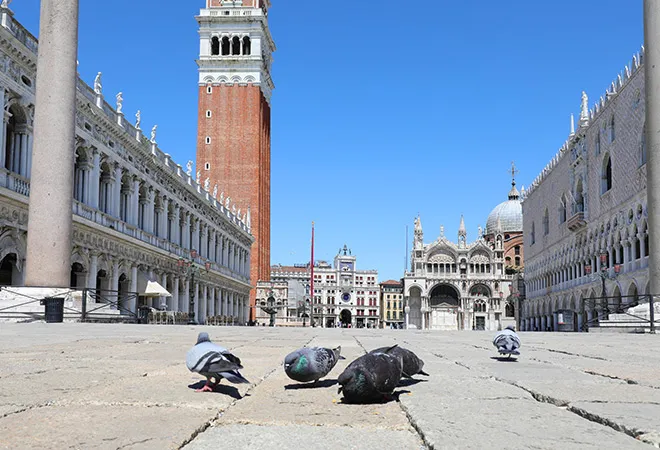
The post-COVID-19 scenario emerging in Italy is anything but reassuring. The poor state of the economy before the emergency has been further impacted by more than hundred days of the lockdown. This is similar to what we have witnessed in many other countries; however, in Italy there is more to it than just this. Something that comes from very far with increased risks that will now disrupt the social fabric of the country: the mafia.
“The pandemic is the ideal place for mafias and the reason is simple: if you are hungry, you are looking for bread, it doesn't matter which oven it originates from and who it is distributing it to; if you need a drug, you pay, you don't wonder who is selling it to you, you just want it. It is only in times of peace and well-being that the choice is possible”. Commenting on the alarm raised by anti-mafia magistrates and police officers, Roberto Saviano—a reknowned Italian author—wrote recently. The mafia and other criminal organisations are trying to leverage the pandemic to regain control over lost territory, to launder money entering legal businesses, and to consolidate businesses they have already invested in the past. Businesses like waste recycling and disposal, transportation, multi-service companies for cleaning and disinfection, funeral homes, oil and food distribution and, of course, medical equipments.
In the last two months they have been operating in a mode well known to South Asia terrorism observers -JuD mode: during the lockdown, in fact, Camorra (the Campania region mafia) was infiltrating societies by distributing little sums of money and food parcels to people in need. The idea behind this was one day they will go asking for something in return. Meanwhile, they are trying to fill the gaps left in the system because of the difficulties faced by the State. Offering cash in exchange for shares to companies in trouble, offering money to people who have lost their jobs and then taking their houses or any other property when they cannot pay. Often, they ask companies to hire someone they trust. Such person will take charge of the company and the owner will play the role of a 'clean' frontman who can deal with banks and institutions. This is not a new phenomena—it can be traced back to 10-15 years in the past. It is also known that the mafia not only entered politics but laundered money and invested in all parts of Italy, especially in the North to gain control over legal businesses in trouble.
One of the worst hit provinces in Italy, Bergamo was also severely affected by the activities of the ‘legal’ mafia. It looks like the post-COVID-19 period will see the situation worsen, since the state may take a long time to contribute due to bureaucratic inertia. Entrepreneurs in need will turn to people who are able to provide support in cash—criminals in suits and ties.
This problem exists outside Italy in other European nations as well, where the presence of not only Italian mafias is seen but also
Russian, Albanian and Chinese. In 2018, during an operation called
'China Truck', the Italian police arrested 33 people and their boss, Zhang Naizhong. The Chinese mafias were running a business covering half of Europe. Their job was to control the movement of goods throughout Italy and and on to Paris, Madrid and Germany. This was beside the
‘usual’ extortion, usury, illegal gambling houses, prostitution and drugs peddling rackets. Several Italian analysts have argued that the mafia and its money could be the only fence for Italian companies against Chinese companies buying Italian brands. After the launch of Internet bots and shameful campaigns in Italy to boost China’s image, and influencing of politicians and media operators—Beijing now appears to be exploiting the economic disaster by buying Italian companies in need. The number of Italian companies purchased by Chinese entities has grown over twenty times in the past ten years.
Italy, before COVID-19, was the
fifth largest destination in terms of number of investments from China. The percentage is now likely to increase.
According to Forbes, China has been purchasing fashion and luxury companies, hi-tech industrial products, entertainment, and even football teams. The Forbes report says that in the last two years “it seems that investors are looking at pure technology developed by smaller companies for purposes related to strategy rather than profit”. Surprisingly, the companies mostly based in Bergamo or Brescia are the most affected areas by COVID-19. The presence of Chinese Mafia operating Italian textile factories with tens of thousands of illegal immigrants in Italy are already a reality. They are shipping ‘Made in Italy’ goods to China and elsewhere.
A black market of fake passports wherein the passports of dead are given out to avoid immigration laws already exists. The ‘white collar’ mafias are the most dangerous because they infiltrate the State, then politics and the very fabric of society. Italy already signed the Belt and Road Initiative (BRI) and it is now at a turning point. The Prime Minister, the ruling party as well as the opposition are unable to take a strong stand against aggressive Chinese politics in the same way they are unable to fight the local white collar mafia. There are books on how the mafia, during the 90s, infiltrated both politics and the economy. The consequence of which was the murder of two judges—Falcone and Borsellino—in 1992, as they worked towards uncovering this. There is enough literature on how the Chinese are buying the country and putting their hands on ‘Made in Italy’. Other news has gone unnoticed—last November, a joint patrolling of the Italian and Chinese police was seen in Tuscany. To this end, the presence of Chinese military on Italian soil is not only questionable but also a matter of concern. The Italian government should take a stand and seek war damages instead of selling Italian goods and thanking the Chinese for their “help”.
The views expressed above belong to the author(s). ORF research and analyses now available on Telegram! Click here to access our curated content — blogs, longforms and interviews.




 PREV
PREV


